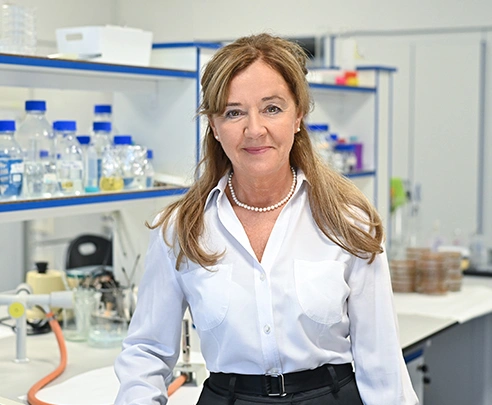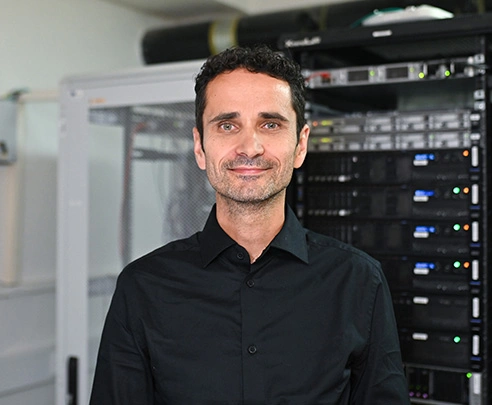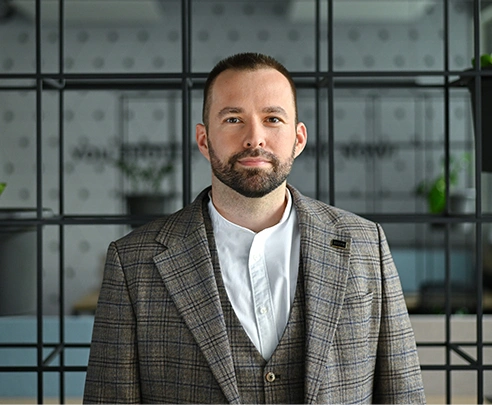Prof. Ing. Igor Farkaš, Dr., is one of the leading Slovak experts on artificial intelligence. In recent years, he has also been active in its popularisation. He is the Associate Department Chair of the Department of Applied Informatics of the Faculty of Mathematics, Physics and Informatics at Comenius University Bratislava. At its Centre of Cognitive Science, he has long been focused on researching artificial neural network models inspired by the human brain.
Igor Farkaš has been fascinated by the brain as the most complex compact structure in the universe since his student days. His interest in the workings of the human mind has survived to this day. He first found it in artificial neural networks that form the link between mathematics and the human brain and are a key part of modern artificial intelligence. He has been researching them for three decades and relied mostly on himself during the early days of neural network research.
The term “artificial intelligence” was coined sometime in the middle of the last century, shortly after the first digital computers were created. It is “artificial” because it is tied to a man-made artefact. And “intelligence” simply because people consider the behaviour of this artificial system – computer program – to be intelligent. „The common perception is that it is a black box, a computational algorithm hidden in a computer that responds to human prompts. Intelligence is now part of smartphones, it's just not visible. The use of AI in large language models, which are behind chat programs such as ChatGPT, has revolutionised the way we use it. It is also visible in autonomous cars, for example, and is slowly appearing in various humanoid robots.“
Professor Farkaš has also recently started to looked closely into combining AI and robotics with a focus on humanoid robots that are an embodiment of artificial intelligence. „Two years ago, thanks to the financial support of our faculty, we were able to purchase a humanoid robot called NICO, which also became the subject of our research within the framework of the TERAIS international project funded by the European Union. Together with my colleagues and students, we plan to equip it with intelligence and a broad spectrum of cognitive abilities,“ Igor Farkaš explains the nature of the research into human-robot interaction. He adds that when working with a robot, its trustworthiness is key, which implies its necessary ability to correctly recognise and interpret human signals, as well as being able to react correctly.
Professor Farkaš graduated in technical cybernetics at the Slovak University of Technology in Bratislava and is a recipient of prestigious Fulbright and Humboldt Foundation scholarships. He has completed long-term research stays in the USA and Germany. He is the guarantor of the international interdisciplinary Master's degree programme in Cognitive Science, the only one of its kind in Slovakia. „Among other things, it enables students to understand themselves, because we are exploring the very nature of the human mind and the computational modelling of cognition in artificial systems. I believe that cognitive science will play a key role in improving artificial intelligence.“
„I am an eternal optimist,“ Professor Farkaš responds when asked about the role of AI in the future. „I think it has the potential to reach and even surpass the level of human intelligence.“ However, he remains aware of all the risks involved and believes that AI will become regulated. This is a question for the scientific community and the global consensus. He also expects mass production of humanoid robots and their universal use in homes and workplaces. „They have a special position among robots because they resemble humans and humans give them human character traits. If we equip them with cognitive abilities, interacting with them can be more natural,“ he says.
As for his free time, Igor Farkaš does not give it too much thought. He freely admits to being a workaholic. He does, however, find time for sports and walks with his dog. He is especially grateful to his wife for her support and tolerance of his excessive work activity. „For me, science is an attitude towards life because it is inherently concerned with knowledge. I'm happy to have the opportunity to do what I really enjoy.“


